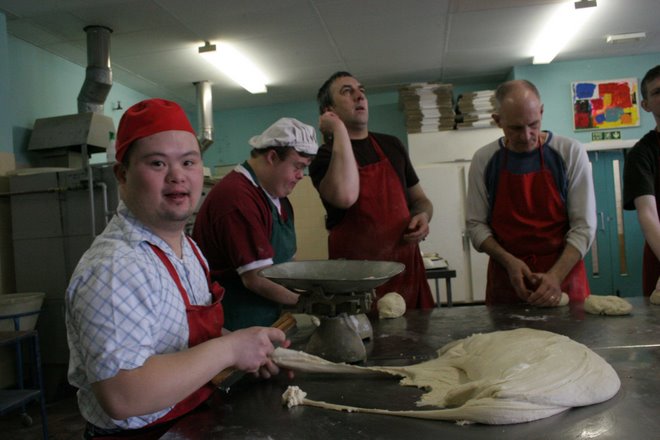The Gorgie district of west Edinburgh is a sinuous urban weave of railway lines and sandstone tenements studded with cheerful nodes of human activity, including Polish delicatessens, cobblers, a city farm, umpteen barbers, a gospel hall and Heart of Midlothian football club. Next week, audiences at Utah's Sundance film festival will enjoy watching another of the area's enterprises.
Breadmakers is an 11-minute documentary about a bakery set up in a former ice cream factory behind a car dealership on Gorgie Road. What makes the enterprise unusual is the fact that all 12 people who work there have learning difficulties.
The director of Breadmakers is Yasmin Fedda, a 27-year-old Lebanese-Canadian, with an MA in visual anthropology and, it seems, an affinity with small-scale food production: her previous film, Milking the Desert, was set principally in the dairy of a Syrian monastery.
Humble material
Breadmakers is one of only 200 (out of 8,000) films to make it through the vetting process for what is the world's biggest showcase for independent cinema. The scale of Fedda's achievement with her relatively humble material can be measured against the subject matter of the other documentaries on offer at Sundance. These include the late head of al-Qaida in Iraq, Abu Musab al-Zarqawi, gang-rape in Congo, Russian fascists, and a dinner party with the president of Pakistan, Pervez Musharraf.
The Garvald bakery is one of half a dozen non-profit organisations that come under the Garvald Edinburgh brand, a voluntary organisation that runs projects "inspired by the ideas of Rudolf Steiner" in Edinburgh and the Borders and is registered to provide accommodation and day services for adults with learning disabilities.
The film is the result of the happy conjunction of Fedda's post-graduate stint in the bakery as a relief worker and the Scottish Documentary Institute (SDI), offering bursaries for short films on the theme of "white". Fedda has interpreted white, in this case, not as flour but noise: the susurrus of scraping and clanking that acts as backdrop to the manufacture of loaves. "I was very interested in the blending of creative and industrial sounds," explains Fedda, who is a former samba drummer. The SDI funding helped pay for Fedda's visit to Utah.
Filming people with learning disabilities presents particular problems; the line between art and exploitation can be fuzzy. Fedda was aware of this and her MA came in useful: "We were taught that the most important thing is the people, not the story." After each day's filming - she spent nine at the bakery - she and her camerawoman would reflect on their new material. "We would talk about it to make sure that everything was being shown in a humane way," Fedda says. The sensitivity paid off. Breadmakers won the Bafta award for best short Scottish documentary of 2007.
Unusually, Garvald Edinburgh demanded no control over the finished product. Its reward is an unexpectedly potent negotiating tool in its imminent funding discussions with Edinburgh city council. It is a delicate subject in the Garvald Edinburgh canteen. "We have the impression that around the top echelons of the council they don't recognise the excellent value for money that we offer," says day service manager Andy Hunter.
Steiner philosophy decrees that everyone's core spiritual being is perfect but sometimes the enveloping body and soul can be flawed; it is just a question of maximising ability. Unfortunately, Garvald Edinburgh's faith in the remedial powers of communal craft workshops - it also provides tuition in, among others, joinery, tool restoring, puppetry, woodwork and ceramics - is not shared by everyone.
Intensive fundraising
Garvald Edinburgh receives only a small weekly three-figure sum for each of its 83 city council placements, significantly less than it needs, and significantly less than its local authority-run equivalents bank. The gap has to be made up by intensive fundraising. The daily sales of around 130 loaves and 70 rolls at least help the bakery to break even.
Fedda's documentary does not offer a critique of Steiner/Garvald policies. In fact, it offers little in conventional cinematic terms. There is no commentary, no interviews, no eavesdropping, no love interest and no conflict, unless you count the moment when Chak-Hong Fung, one of the documentary's participants, in an apparent fit of pique, drops his dough mixture off the end of the table.
In the course of 11 minutes, the only plot is the narrative arc of granary batches from telephone order to delivery van. The only music is a sign-off, straight-to-camera, whistling of For He's a Jolly Good Fellow by 32-year-old breadmaker Thomas Griffiths. Considerable footage was shot of the funeral of a bakery colleague, but Fedda opted to exclude it: "It was a distraction and it took too long to explain."
Jim Hickey, a former director of Edinburgh film festival and Fedda's co-producer, speculates that it is this sparseness that seduced the Sundance selectors. "Struggling farmers, football hooligans, cosmetic surgery - we've seen all that before. This takes you to somewhere you would never normally see."

No comments:
Post a Comment